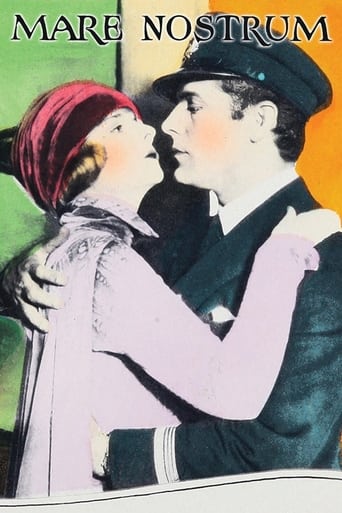

Purely Joyful Movie!
... View MoreOverrated and overhyped
... View MoreIt’s fine. It's literally the definition of a fine movie. You’ve seen it before, you know every beat and outcome before the characters even do. Only question is how much escapism you’re looking for.
... View MoreOne of the film's great tricks is that, for a time, you think it will go down a rabbit hole of unrealistic glorification.
... View MoreSince he was a child Ulysses Farragut had been in love with the sea embodied in the legend of the beautiful Ampitetre. Against his fathers wishes he grows up to captain his own boat The Mare Nostrum but as blissful as his life on the waves is it takes him away from his family. When The War breaks out the lucrative business of shipping as a neutral nation (Spain) calls for even more of his time. While on a tour of ruins he meets a German spy who fulfills his childhood ideal. She seduces him and he in turn agrees to assist re-fueling U boats seeking military targets. His actions result in catastrophe however when it sinks a passenger ship. Haunted by guilt and the need to exact revenge Farragut pursues those responsible.Shot on location in Europe Mare Nostrum has an impressive look filled with the rich attention to detail that silent film director Rex Ingram and cameraman George Seitz (Four Horsemen of the Apocalypse) excelled at. Along with Von Stroheim he provided the era with the most lush and textured canvases and Mare Nostrum is a gallery of splendid landscapes, interiors and portraits to behold. Given its splendid look and fine chemistry and performances from Antonio Moreno and Alice Terry it moves along at a leisurely but absorbing pace. The supporting cast is also up to task with a trio of effective villains singling out Paquerette's Dr. Feldman. Its a pity that Ingram retired from directing at an early age, it would have been interesting to see more extensive sound work which he did only briefly. As far as cameraman Seitz he would go to work on a regular basis with legendary directors Preston Sturges and Billy Wilder in their peak. I'd say he's a lot more important to the history than given credit for.
... View MoreHandsome seaman Antonio Moreno (as Ulysses Ferragut) grows up enthralled by the legendary goddess "Amphitrite". The bewitching blonde is described as "the mother and sweetheart of all Mediterranean sailors," and Mr. Moreno keeps a portrait of her in his Barcelona home. There, Moreno lives comfortably with dark-haired wife Kithnou (as Cinta) and their beloved son Michael Brantford (as Esteban). Moreno captains his freighter ship "Mare Nostrum" (Latin for "Our Sea") along the Mediterranean while his wife worries about their son's frequently absent father...To be a better father, Moreno decides to give up the lovely "Amphitrite" illusion and his seafaring to spend more time at home. This would leave the "Mare Nostrum" in the hands of Frederic Mariotti (as Toni) and obese Christian cook Hughie Mack (as Caragol). But, two things alter Moreno's plans. First, the Great War (aka World War I) begins, making his shipping business more lucrative and important. Then, Moreno meets alluring Alice Terry (as Freya Talberg), who appears to be the sea goddess "Amphitrite" come to life. Alas, Ms. Terry is no goddess, she's spy for Germany! Continuing to strive for art, director Rex Ingram slowed down his dramatic pace and vowed to film exclusively outside of Hollywood for "Mare Nostrum". It had all the ingredients of a blockbuster - successful director (Ingram), handsome star (Moreno), proved source material (Ibanez), and popular female (Terry) - all done at a healthy budget for MGM distribution. Trouble is, the film simply does not deliver the anticipated excitement. While it seems to presently be lacking its original soundtrack, the surviving print is great condition. It's beautifully shot in France, Italy and Spain.****** Mare Nostrum (2/15/26) Rex Ingram ~ Antonio Moreno, Alice Terry, Hughie Mack, Mickey Brantford
... View MoreThis is a lavishly produced wartime romance and, as is typical of Ingram, quite stylishly handled (benefiting also from the fact that it was filmed in Europe, the director himself being based in France). The plot places its old-fashioned impossible and, inevitably, tragic love story against the backdrop of a nostalgic view of the sea and the simple fisher-folk who live and die in it, the bourgeoisie with their stuck-up attitude and high ideals and, naturally, an impending world-war situation; for all that, it's most interesting when dealing with the various espionage elements and especially the two submarine attacks (which must have been a novelty at the time) led by a bald-headed and aristocratic German officer, obviously inspired by Erich von Stroheim!Still, Alice Terry's poignant performance as the female spy (who has mixed emotions about her mission and who happens to be the spitting image of Amphitrite, the Sea Goddess who protects fishermen) is the core of the film; this was perhaps the best role she ever had (directed, naturally, by her husband). Antonio Moreno is less impressive as the male lead, though his disheveled appearance when forced to work for the enemy and following his son's death (for which he is partly to blame) is appropriately world-weary. The beautiful and poetic finale, then, sees the drowning Moreno (after his ship was torpedoed by the sub he helped fuel!) being picked up by Amphitrite herself. Reportedly, this was Ingram's favorite among his own films - as well as Terry herself and Moreno, too!
... View MoreAbout ten minutes into this plush production comes a jaw-dropping scene of visual fantasy--a vision of the maritime goddess Amphitrite--which is matched by a similarly striking underwater sequence at the end. Unfortunately, between these bookends sits a Victorian melodrama of adultery/guilt/expiation, which is then shoe-horned into a WWI spy plot: betrayal of spouse reflected in betrayal of country.Despite its mythological and religious trappings, this is deeply conventional story-telling: while an artist examines the ambiguities of behavior, director Rex Ingram is satisfied with this formula plot, leaving his actors no credible characters to develop and only pot-boiler dialogue to mouth ["You are the only man I ever loved!"]. So, although Antonio Moreno looks fit in his sailing captain's uniform, he mostly frowns in pain or puzzlement, while the excellent Alice Terry must enact everything from villainy to martyrdom with little help. The other players are earnest, some used for heavy-handed stabs at humor; however, this film's disregard for people becomes clear as--late into the film--new, throw-away characters keep appearing to deliver more exposition.The action sequences--impressively shot on locations in Barcelona, Marseilles and Naples--include a mob chasing a German spy around a harbor, plus several submarine attacks and shipwrecks [done with entertainingly elaborate though unconvincing miniatures]. Yet even the visuals seem conventional and static, like academic paintings, especially when compared to the cinematic dynamism of Sternberg or Walsh.The title refers to the Mediterranean Sea, but is also the name of the hero's ship, and acquires still a third meaning at the end.
... View More